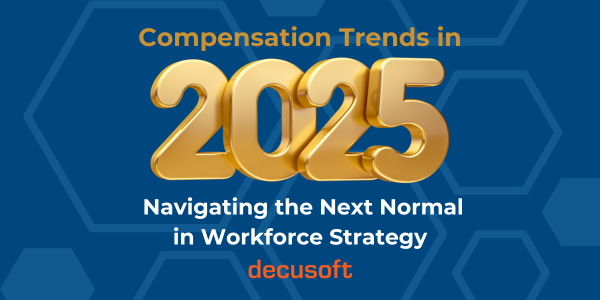Choosing a compensation management vendor can be extraordinarily challenging. There are dozens of companies in the space, and many offer tailored products that meet hyper-specific requirements. This DecuSoft guide will help you identify the best way to find, evaluate, and select a compensation management solution that can simplify and improve your comp management process.
Why use Compensation Management Software?
Compensation typically accounts for nearly 70% of a company’s total expenses. Compensation management software enables you to seamlessly manage complex compensation plans across departments and incentive plan structures. Many organizations today use spreadsheets to manage comp plans for their employees. This isn’t necessarily a bad approach, but if you have multiple compensation plans or significant complexity it can lead to unforced errors in compensation, difficulties with regulatory compliance, security issues, lack of audit trail, issues with version control. Spreadsheets were never designed to be an enterprise solution and Compensation Management software can make it easy to manage complex compensation plans while also ensuring that employees are paid fairly for their work and their incentive plans are properly implemented. Additionally, they improve data integrity, mitigate risk, and should save you time and money managing your compensation processes.
Starting Your Compensation Management Solution Search
Starting a search for compensation management solutions can be daunting. However, there are a few ways to make it easier. The first and most important step is to rigorously document your current compensation management system plan designs. Identify the pain points that are currently reducing efficiency and causing problems within your organization. Are there inaccuracies in employee compensation? Poor change control? Clearly document the pain points you are looking to address since these will be some of the most critical considerations when selecting a new vendor. You should then attempt to prioritize the most critical and identify the need to have versus like to haves because the likelihood of finding one vendor who does it all is not realistic.
Documenting Compensation Solution Requirements
Once you have completed this exercise you should have a fairly good idea of what an ideal compensation management system will look like for your organization. Take the time to write down a requirements document that will serve as a guide going forward when evaluating various vendors. Once you have completed an initial draft, get feedback from different members of your team in both HR and inter-departmentally as makes sense. In addition, identify stakeholders who will be impacted by the decision so you can ensure that they are involved and regularly updated as you move forward. Some common stakeholders could include employees from finance & accounting, HRIS/IT, operations, sales, business development, and HR Business Partners. It can be helpful to sort requirements into different categories based on criticality and create a vendor scorecard so you can document and remember what the various providers offer.
Example Requirements List
Must Haves:
- Security
- Integration with other HRIS/HCM like Workday, Oracle, Ultimate, SAP
- Configurability & flexibility
- Change Control
- Audit Trail
Preferred:
- User-Based Pricing – SaaS/Support, Implementation (fixed bid versus time and materials)
- Dedicated Customer Support – third party provider or directly from the vendor
Obviously, your requirements sheet will be much more in-depth than this but having one will prove invaluable in your search. You will likely find as you begin evaluating different compensation vendors that it continually expands as you identify additional features from different vendors. In addition, your human resources team and other stakeholders will likely have requirements that you hadn’t considered.
Focus On Integrations
Compensation management software typically works in conjunction with numerous other human resources software applications. When building your requirements document, look at HR and compensation data flows and be sure to identify every application that your new compensation management solution will need to integrate with. Even if a solution doesn’t have direct integration, many will either have an API or secure data transfer protocols that can be leveraged to build and integrate.
Identify Compensation Management Project Scope
When considering vendors it is critical to identify the scope of changes you are hoping to make to current business processes. Compensation management software is typically used in addition to other human resources software so clearly articulating the problems you are looking to solve, the timetables you want to solve them on, and the deadlines that you are facing is critical. Communicate these both internally and with specific vendors.
So if you know everything that you’re hoping to accomplish, selecting a vendor that can help you deliver against those in time is important, but you may not choose to execute against all of them initially. So you might want to list maybe things that you need for your actual year and compensation cycle. As you’re a phase one, you could layer in reports or some more customer outside configurable pieces, and later phases. It’s important to find a provider you can grow with by adding functionality over time and it’s OK to do a phased approach in year one versus trying to “boil the ocean” and get it all done.
Identifying potential Compensation Management partners
Take your requirements list and begin identifying an initial list of vendors that appear to meet your must-have requirements. It can be a good idea to speak with acquaintances and ask for referrals to vendors that they are using, particularly if they are within your vertical. Peers also may be aware of pain points that you hadn’t considered and could help add to your requirements document.
Consider Using a Third-Party for Vendor Selection
There can be significant upsides to utilizing a third-party that specializes in helping match companies with compensation management vendors. They can easily take a requirements document and often know directly which products are likely to be a good fit and worth going through a demo of, particularly if there are complex implementation or special feature requests. The downside is that this can add cost to the process and potentially delay the project onset.
Use Software Review Sites
There are dozens of software review sites that can help you evaluate compensation management vendors. Here are some key ones to check as you begin forming your list of potential vendors:
Capterra
Capterra is one of the most widely used software review sites in the world and currently has listings for 115 different compensation management vendors.
G2
G2 is another large software review site with dozens of compensation management vendors.
Software Advice
Software Advice currently holds listings and reviews for 43 different compensation management solutions.
Make Sure to Involve All Stakeholders
It’s worth emphasizing how important it is that you involve all the key stakeholders throughout your organization in vendor selection. Some employees may have experience with other solutions and provide valuable input on which vendors to consider or ignore. Even employees who aren’t directly involved in HR can have valuable input and should be informed throughout the vendor selection process. The key decision-makers should be involved and attend all vendor meetings.
Finalize Your List And Write Your Demo Script
By now you should have a good place to start from. Finalize your list of potential vendors and document the questions that you need to have answered during the product demo. Make sure to take detailed notes during each demo and compare feature sets of different vendors against your documented requirements. You should also take the time to write a demo script, clearly articulating your current compensation management processes and requirements to potential vendors can dramatically increase the speed of the selection process, while also enabling you not to waste time on vendors who can’t meet your needs.
Evaluating Compensation Management Partners
Now it’s time to begin scheduling demos. It’s worth asking if the provider can record the demo, or if they mind if you record the demo so you can share it with interested parties later on in the process. Make sure that you come away from each demo with a clear understanding of how many requirements that the potential partner meets, as well as their price point, integrations, and contract terms. Here are some key questions that can help you identify whether a vendor will meet your needs:
How is implementation accomplished?
Implementation is one of the most critical parts of adopting a new solution to help manage employee compensation. Users need to be trained on how the new software works, the software needs to be integrated into existing systems, and data flows need to be mapped, and rigorous testing needs to occur to ensure the solution is properly implemented. Ask the vendor whether they perform implementations in-house, using a third-party, or with a hybrid approach.
How is implementation priced?
There are numerous methods for pricing implementation including time and materials and fixed bid pricing among others. We recommend selecting a vendor who offers fixed pricing, we believe this pricing method best facilitates a partnership rather than a vendor-client relationship and can help prevent costs from running out of control. If you do end up going down the time and materials route, it’s important to set clear expectations upfront. It’s worthwhile to discuss acceptable costs internally as well as with your vendor along with the rates.
How is support handled?
With the addition of almost any software to an enterprise environment, requiring help from support at some point is almost inevitable. Your internal administrators will likely be fielding many end-user questions, some of which they might not be able to answer. Make sure you find out how your vendor handles support requests. Ideally, you will be assigned an account representative who you can both email and call to answer questions. If a potential vendor offers you a 1-800 number, or solely email-based support, it is worth pausing to consider whether or not that will be adequate depending on the complexity of your requirements.
What Security Features does the product have?
Security for compensation management software is critical. Make sure to ask your prospective vendor what security features are available on their platform. It is also worth double-checking with your internal information security team to see what feature sets they believe are required, and what features would be nice to have. It’s also important to have the vendor complete a Security assessment or DDQ (Due Diligence Qualification) and make sure they are SOC compliant.
Final Thoughts
Selecting the right compensation management partner can be challenging and we’re here to help. Make sure to document your current processes thoroughly, test potential solutions against requirements, and evaluate multiple solutions to find the right fit for your organization. If you are currently in the market for a compensation management solution, you can request a demo of Compose by Decusoft at www.DecuSoft.com and realize that nearly 70% of HCM buyers typically regret their buying decision and it’s not due to cost, user experience, or product functionality; it has to do with ongoing service/support post-go-live. So do your homework ahead of time. Interested in reading more? Check out our Complete Guide to Compensation Management.




